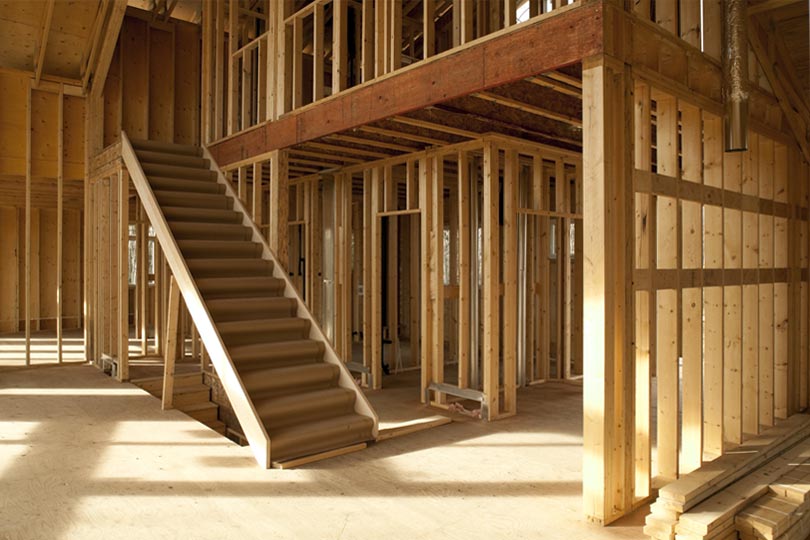Comparing One-Time Close Mortgages to Non-Residential Construction Loans

One-Time Close construction loans are approved for residential properties. You can get these as a VA or FHA construction loan, and the usual occupancy requirements associated with VA loans and FHA mortgages apply to construction, too.
But there are also construction loans designed for business purposes. Both serve the purpose of financing construction projects, but they have different requirements.
One-Time Close Construction Loans for Residential Homes
OTC loans are often referred to as Construction-to-Permanent Loans. This is a streamlined financing option for those who want to combine the construction phase and the long-term mortgage into a single loan closing.
Doing so removes the need for multiple loan applications, approvals, and closing costs associated with building from the ground up.
Government agencies (VA and FHA) guarantee their versions of OTC loans and construction
mortgages.
These loans offer competitive interest rates, flexible loan qualification options, and potentially lower down payments, making them quite appealing to those who want to build but don’t want to apply for a conventional mortgage.
Construction Loans for Businesses
Unlike residential construction loans, these loans are intended for projects involving commercial buildings, industrial facilities, retail spaces, and multi-family housing units.
Non-residential construction loans and multi-family construction loans are typically for those in business, for developers and investors looking to expand their operations, generate rental income, and to those who want to sell the properties for a profit.Government agencies and programs, including the Small Business Administration (SBA) and the
U.S. Department of Agriculture (USDA) Business and Industry Guaranteed Loan Program may support non-residential construction loans.
There are SBA, USDA, and “industry-guaranteed” loans to compare when planning a project.
Basic Differences Between the Two Loan Categories:
One-time close Construction Loans are typically offered to those who want a primary residence. Government-backed programs often have specific eligibility criteria based on income, credit history, and the residential nature of the completed home.
You can use the completed home for business purposes if it is owner-occupied and the non-residential use of the house is "subordinate" to the residential use.
Business Construction Loans typically appeal to a broader range of borrowers, including businesses, developers, and investors. No occupancy is required for non-residential loans, and the terms for multi-family housing may vary depending on the lender.
Want More Information About One-Time Close Loans?
We have extensively researched the FHA (Federal Housing Administration) and the VA (Department of Veterans Affairs) One-Time Close Construction loan programs.
We have spoken directly to licensed lenders that originate these residential loan types in most states, and each company has supplied us with the guidelines for their products.
We can connect you with mortgage loan officers who work for lenders who know the product well and have consistently provided quality service.
If you are interested in being contacted by a licensed lender in your area, please send responses to the questions below. All information is treated confidentially.
OneTimeClose.com provides information and connects consumers to qualified One-Time Close lenders to raise awareness about this loan product and to help consumers receive higher-quality service.
We are not paid for endorsing or recommending the lenders or loan originators and do not otherwise benefit from doing so. Consumers should shop for mortgage services and compare their options before agreeing to proceed.
Please note that investor guidelines for the FHA and VA One-Time Close Construction Program only allow for single-family dwellings (1 unit)—NOT for multi-family units (no duplexes, triplexes, or fourplexes).
In addition, the following homes/building styles are not allowed under these programs: Kit Homes, Barndominiums, Log Cabins, Shipping Container Homes, Stilt Homes, Solar (only), or Wind-Powered (only) Homes.
Please send your email request to [email protected], which authorizes OneTimeClose.com to share your personal information with one mortgage lender licensed in your area to contact you.
1. Send your first and last name, e-mail address, and contact telephone number.
2. Tell us the city and state of the proposed property.
3. Tell us your and/or the Co-borrower’s credit profile: Excellent – (680+), Good - (640-679), Fair – (620-639), or Poor- (Below 620). 620 is the minimum qualifying credit score for this product.
4. Are you or your spouse (Co-borrower) eligible veterans? If either of you is an eligible veteran, down payments as low as $0 may be available up to the maximum amount your debt-to-income ratio per VA will allow – there are no maximum loan amounts as per VA guidelines.
Most VA lenders will go up to $1,500,000 and review higher loan amounts on a case-by-case basis. If not, the FHA down payment is 3.5% up to the maximum FHA lending limit for your county.
Do you know what's on your credit report?
Learn what your score means.

September 13, 2024Do you want to build a home using an FHA or VA One-Time Close loan? If you do not currently own land or you need to keep the land you already own for another purpose, there are several considerations when buying undeveloped land you want to use to build your dream home on. Building on a new plot of land can provide some borrowers with additional customization and personalization options. It may offer greater control over the design and layout of your dream home.
September 6, 2024One-Time Close Mortgages can be an appealing option for those who want to build their dream home instead of buying someone else’s house.
Unlike traditional construction loans that involve multiple closings and complex financing stages, a One-Time Close Mortgage simplifies the process, potentially saving borrowers time and money. A One-Time Close mortgage features financing for the construction phase plus the permanent mortgage, presented as a single loan.
August 30, 2024Construction loans differ significantly from existing construction mortgages. The unique nature of these loans includes some potential challenges borrowers must be prepared to handle. What choices do you need to make about construction loans during the planning stages? What about after the construction begins?








